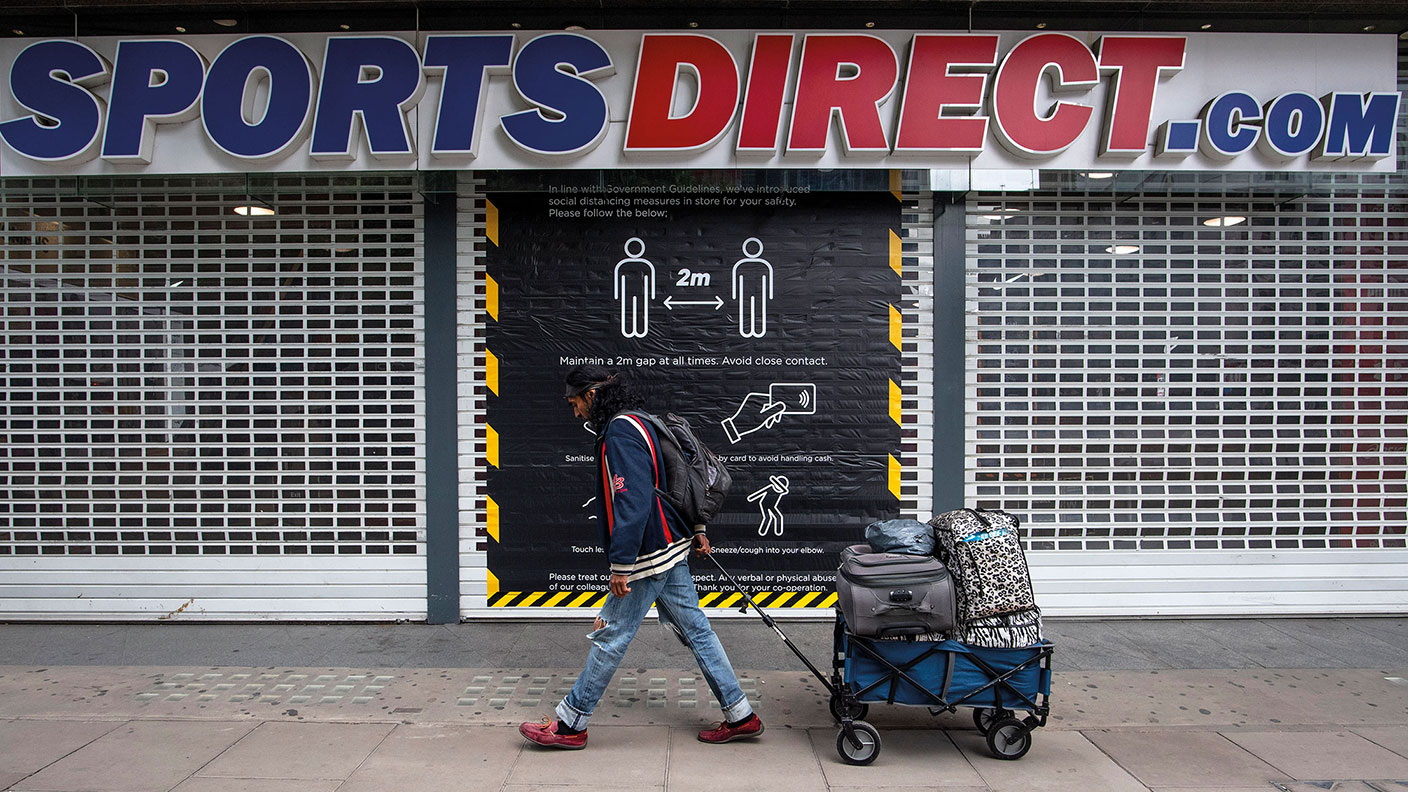Frasers Group in the firing line after profit warning
Frasers Group, the owner of Sports Direct, is not the only retailer set to suffer now that new Covid restrictions have been introduced. Matthew Partridge reports


Get the latest financial news, insights and expert analysis from our award-winning MoneyWeek team, to help you understand what really matters when it comes to your finances.
You are now subscribed
Your newsletter sign-up was successful
Want to add more newsletters?
Frasers Group’s shares plunged by 10% this week after it “sounded the alarm” on profits, says Laura Onita in The Daily Telegraph. The news followed store closures in London and swathes of the South East due to the new Tier 4 rules .
The retailer, which owns chains including Sports Direct, House of Fraser, Evans Cycles and Game Digital, said its previous guidance from earlier this month of a 20%-30% rise in annual profits was “unlikely to be achieved”. The new rules mean that many shops will be forced to close to customers yet again and there is a “high likelihood” of “further rolling lockdowns” over the next few months.
The new restrictions closing all non-essential retailers will hit Frasers particularly hard since it is “heavily reliant” on “bricks and mortar” high-street sales, unlike online-only rivals, says Jim Armitage in the Evening Standard. The disruption may also have a knock-on effect on its plans to buy parts of the Debenhams and Arcadia businesses now up for sale. While it could make the brands “even cheaper”, Frasers’s problems mean that its “financial firepower” could be reduced. Already it looks as though Arcadia will be sold off “piecemeal”, with Australia’s City Chic agreeing to buy Evans clothing.
Try 6 free issues of MoneyWeek today
Get unparalleled financial insight, analysis and expert opinion you can profit from.

Sign up to Money Morning
Don't miss the latest investment and personal finances news, market analysis, plus money-saving tips with our free twice-daily newsletter
Don't miss the latest investment and personal finances news, market analysis, plus money-saving tips with our free twice-daily newsletter
Clothing sales plunge
Of course, Frasers Group isn’t the only retailer to be affected by the change in plans, says the Financial Times. The share prices of Next, Ted Baker and Superdry have all been hit. The new restrictions are particularly painful since they come during the peak trading period in the run-up to Christmas.
The November lockdown has already caused a lot of damage, with clothing sales falling by nearly a fifth compared with the previous month, says Phillip Inman in The Guardian. Sales of household goods rose by 1.6% and many online operators reported booming sales, with internet-shopping now accounting for 31.4% of all spending, “an increase of almost 75% since November 2019”. But this was partly due to “heavy discounting”. Overall retail sales fell by 3.8% month-on-month.
Even if retailers can keep selling during Tier 4, they are increasingly relying on consumer credit, says Graham Ruddick in The Times. While credit allows shoppers to spread the cost of items in a “manageable way”, there has been “dramatic growth” of such schemes, either directly or through financial technology companies such as Klarna. More than 70% of Next’s sales in the first six months of the year were made on credit. With the FCA, the City regulator, due to report on unsecured credit next year, companies could be forced to change the way such schemes are run.
Get the latest financial news, insights and expert analysis from our award-winning MoneyWeek team, to help you understand what really matters when it comes to your finances.

-
 Invest in the beauty industry as it takes on a new look
Invest in the beauty industry as it takes on a new lookThe beauty industry is proving resilient in troubled times, helped by its ability to shape new trends, says Maryam Cockar
-
 Should you invest in energy provider SSE?
Should you invest in energy provider SSE?Energy provider SSE is going for growth and looks reasonably valued. Should you invest?
-
 Has the market misjudged Relx?
Has the market misjudged Relx?Relx shares fell on fears that AI was about to eat its lunch, but the firm remains well placed to thrive
-
 8 of the best properties for sale with minstrels’ galleries
8 of the best properties for sale with minstrels’ galleriesThe best properties for sale with minstrels’ galleries – from a 15th-century house in Kent, to a four-storey house in Hampstead, comprising part of a converted, Grade II-listed former library
-
 The rare books which are selling for thousands
The rare books which are selling for thousandsRare books have been given a boost by the film Wuthering Heights. So how much are they really selling for?
-
 How to invest as the shine wears off consumer brands
How to invest as the shine wears off consumer brandsConsumer brands no longer impress with their labels. Customers just want what works at a bargain price. That’s a problem for the industry giants, says Jamie Ward
-
 A niche way to diversify your exposure to the AI boom
A niche way to diversify your exposure to the AI boomThe AI boom is still dominating markets, but specialist strategies can help diversify your risks
-
 New PM Sanae Takaichi has a mandate and a plan to boost Japan's economy
New PM Sanae Takaichi has a mandate and a plan to boost Japan's economyOpinion Markets applauded new prime minister Sanae Takaichi’s victory – and Japan's economy and stockmarket have further to climb, says Merryn Somerset Webb